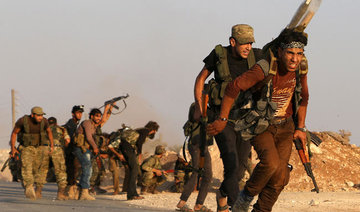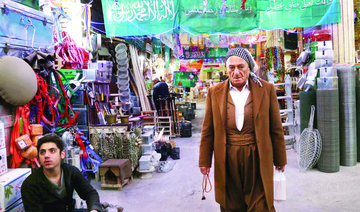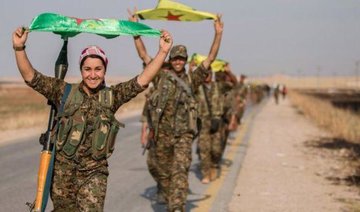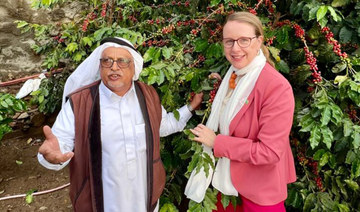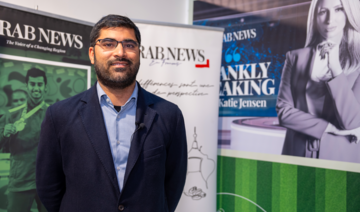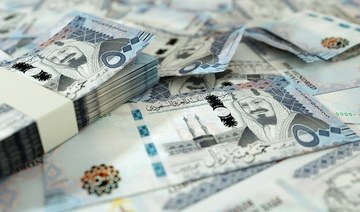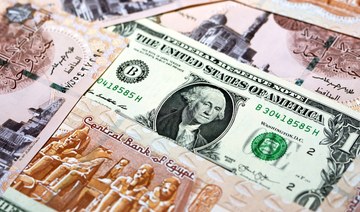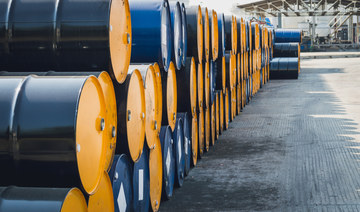MAARAT Al-NAASAN: In a opposition-held town in Syria’s northwest, streams of crude oil are piped into a cylindrical tank to be primitively refined, capping a weeks-long odyssey from fields further east.
Over the past two years, nearly 100 makeshift refineries have cropped up around olive groves in Maarat Al-Naasan, now a hub for processing precious “black gold” in Idlib province.
Bringing consumer products into the extremist-controlled province is notoriously difficult, as it has been almost entirely cut off from government areas since Syria’s war erupted six years ago.
And smuggling goods across the closed border from rebel-backer Turkey is very expensive.
To keep cars, bakeries and heating units running in the province, Idlib residents-turned-oilmen are trucking in crude from Syria’s northeast to refine it and distribute it to the population.
“We can’t bring fuel from regime areas or from another country, so we’re forced to refine it here,” says Jamil Al-Nimr, the bearded 34-year-old owner of one refinery.
The primitive process yields “gasoline, kerosene, and diesel, which is then distributed to the local markets,” says Nimr.
But it first begins hundreds of miles to the east in Syria’s Hasakah, a mostly Kurdish-controlled province dotted with oil and gas fields — an arduous and expensive journey.
Barrels of crude are purchased from the Hasakah fields for $47 each and an army of truck drivers then begins the weeks-long trip back west.
“The journey takes between 20 days to a month,” says Abu Al-Omarein, a 41-year-old truck driver.
Along the 400-kilometer (248 miles) route that cuts through Syria’s fractious war-ravaged north, they pass through numerous checkpoints manned by Kurdish and rebel factions.
At each checkpoint they must pay a toll and by the time they reach Maarat Al-Naasan, they will have paid the equivalent of $17 per barrel in fees.
Abu Al-Omarein said he and fellow truck drivers used to bring crude from fields controlled by Daesh group in Syria’s oil-rich eastern Deir Ezzor province, but not anymore.
The extremists now hold just a sliver of the province after losing out to twin offensives by Russian-backed regime forces and US-supported fighters.
On a recent day Abu Al-Omarein sat on the ground at the entrance to Maarat Al-Naasan, sipping a warm cup of tea and chatting with fellow drivers as the crude oil barrels were unloaded from the trucks.
The crude is funnelled into a large metal cylinder where it is heated and separated into gasoline, kerosene and diesel.
The liquids then pass along metal pipes through a basin of water, which cools them down so they can be collected in plastic containers for sale.
The processing costs $24, leaving consumers paying an average of $95 per barrel.
Malek Hajj Hamdan says he relies on these primitively refined oil products to run his bakery because they are more affordable than those provided, irregularly, by the Syrian government.
The oil refined in Maarat Al-Naasan is 30 percent cheaper than what arrives from regime areas, he says, adding that this ultimately means that he can sell his bread at a lower cost.
But this oil also contains many “impurities” that damage his baking equipment, says Hamdan.
The rudimentary refining process has also taken a toll on the health of residents, according to Fahed Al-Abd, a specialist in internal and cardiac medicine at Maarat Al-Naasan’s medical center.
Around 2,000 patients a year, mostly children under 15, suffer from complications from “the organic materials spread in the air as a result of the refineries and the primitive processing of crude petroleum products,” says Abd.
Six-year-old Abdel Nasser was one of those affected in Maarat Al-Naasan.
Around a year ago, dark spots began appearing in a thick diagonal line across his cheeks, his father Abu Yahya says.
“There were a lot of refineries around town putting out a ton of smoke and gases and causing uncontrollable damage,” he says. “The biggest proof of this is my son.”
“Thank goodness, we are treating him now, but the doctor told me that the marks will be there for the rest of his life.”
The medical center blames “gases and unclean air” emanating from the refineries for Abdel Nasser’s condition.
To scale back the environmental damage and adverse health effects, rebel authorities have set up strict schedules during which refineries can operate.
“In the past, the 100 refineries in Maarat Al-Nasaan used to operate every day, all at the same time,” says refinery owner Riad Haydar, 37.
“But today, they take turns... so around 20 or 25 operate each day.”
In opposition Syria, makeshift refineries process precious crude
In opposition Syria, makeshift refineries process precious crude
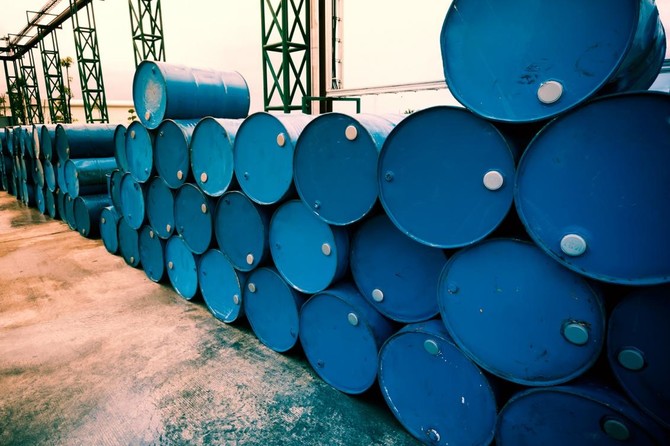
Saudi Coffee Co. receives license to build Kingdom’s first coffee production factory in Jazan
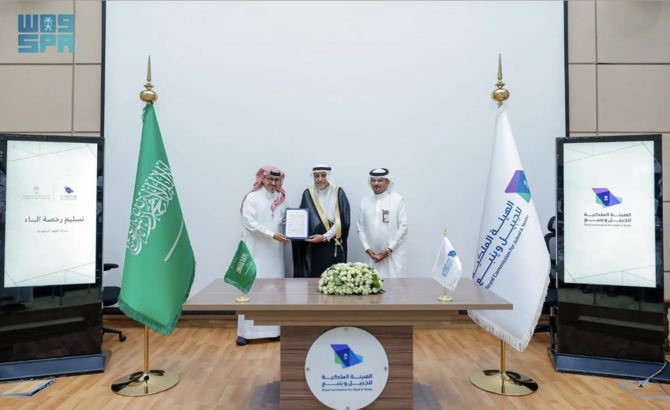
RIYADH: Saudi Coffee Co. has been given approval to begin operations in Jazan, marking the establishment of the first production facility for the product in the Kingdom.
This comes as Khalid bin Mohammed Al-Salem, president of the Royal Commission for Jubail and Yanbu, issued the license to the Public Investment Fund firm, the Saudi Press Agency reported.
The factory, which will be built on an area of 30,000 sq. m, seeks to produce and export Saudi coffee, strengthen local and global supply chains in line with the goals of Vision 2030, and contribute to the sustainability of the sector.
This move came as part of the city’s signing of various investment agreements and capital contracts.
Saudi Coffee Co. signed an investment deal with the Royal Commission for Jubail and Yanbu to construct the warehouse in November 2022.
According to a statement released at the time, the new facility is expected to raise Saudi coffee output from the current 300 tonnes per year to 2,500 tonnes by 2032 while further developing a more sustainable and localized value chain.
Red Sea Global collaborates with Almosafer to elevate tourism sector in Saudi Arabia
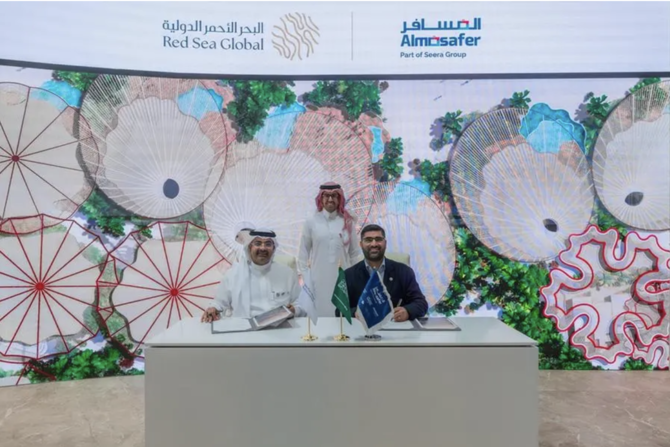
RIYADH: Saudi Arabia’s tourism landscape is set for a boost after multi-project developer Red Sea Global signed an agreement with travel company Almosafer.
According to a statement, the deal will see the firm showcasing and promoting the destination’s tourism developments and offerings.
“With Almosafer’s support, we will help travelers discover just how special this part of the world is, from the pristine coastline and breathtaking coral reefs to the stunning dunescapes and wadis,” said Group CEO of Red Sea Global John Pagano.
He added: “Our growing portfolio is set to unlock the tourism potential of the Red Sea coast for all segments of travel with a diverse range of experiences and offerings.”
Under the deal, both companies will collaborate on targeted marketing and promotion campaigns to raise awareness among travelers, highlighting the offerings in the Red Sea and AMAALA.
Developing the tourism sector is crucial for Saudi Arabia, as the Kingdom is steadily pursuing its economic diversification journey by reducing its dependency on oil.
Saudi Arabia’s National Tourism Strategy aims to attract 150 million visitors to the Kingdom by 2030 and create 1.6 million jobs in the sector.
“The partnership with Red Sea Global reflects our shared vision for redefining luxury travel and shaping the future of luxury tourism in Saudi Arabia. We are excited to leverage our geographical reach and decades of experience to position them as the ultimate destinations that set new standards in bespoke tourism experiences,” said Muzzammil Ahussain, CEO of Almosafer.
With 79 hotels in total, the Red Sea and AMAALA are projected to contribute SR33 billion ($8.79 billion) annually to the Kingdom’s economy upon completion in 2030.
Meanwhile, Red Sea Global also signed another deal with Saudia, the national flag carrier of Saudi Arabia, to streamline the travel experience of employees working with the multi-project developer.
The partnership will enable employees of Red Sea Global and its affiliates to access exclusive upfront discounts and special corporate rates while traveling with Saudia, the Saudi Press Agency reported.
“We are excited to collaborate with Red Sea Global and offer them seamless travel solutions to connect with international partners and talent,” said Saudia chief commercial officer Arved Von Zur Muehlen.
He added: “This partnership reflects Saudia’s unwavering commitment to supporting the Kingdom’s economic objectives and positioning it as a global tourism hub.”
Global ESG sukuk market projected to surpass $50bn thanks to funding diversification
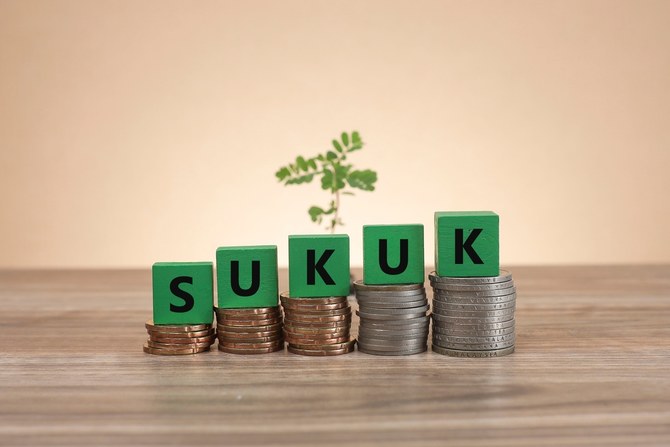
RIYADH: The global sukuk market linked to environmental, social, and governance principles is expected to exceed $50 billion in the next two years driven by funding diversification goals.
According to Fitch Ratings, other factors catalyzing the growth of these Shariah-compliant debt products include new ESG mandates, regulatory frameworks, and government-led sustainability initiatives.
The report highlights that the global ESG sukuk rose by 60.3 percent year-on-year to reach $40 billion outstanding at the end of the first quarter of 2024.
Bashar Al-Natoor, global head of Islamic Finance at Fitch Ratings, said: “Almost 99 percent of all Fitch-rated ESG sukuk are investment-grade. The year started with key regulatory initiatives, which could support standardization, ecosystem development, and aid transparency.”
He added: “There is significant ESG sukuk growth potential, and continuous efforts and increasing confidence will be key to unlocking this.”
The instrument, also known as green sukuk, is a Shariah-compliant financial tool wherein issuers utilize the proceeds solely to finance investments in renewable energy or other environmental assets.
The credit rating agency added that sukuk has a significant share of ESG debt in core markets.
“In the GCC (Gulf Cooperation Council) countries, ESG sukuk reached $15.9 billion outstanding, representing 45 percent of the ESG debt mix, with the balance in bonds,” said Fitch in the report.
However, it added that the market could face challenges from factors like geopolitical tensions, high oil prices, and new Shariah requirements, which might alter sukuk credit risks.
In April, another report from Fitch Ratings indicated that the issuance of this debt product would continue to grow in the remaining months of the year, albeit at a slower pace compared to the first quarter.
The report highlighted that countries in the GCC accounted for 35 percent of the global outstanding sukuk.
Fitch also revealed that the GCC debt capital market has reached $940 billion in outstanding sukuk and is steadily approaching the $1 trillion mark.
In February, it projected that ESG sukuk would exceed 7.5 percent of the global outstanding Islamic bonds in the coming years.
Egypt’s non-oil business shrinks for 41st straight month, PMI shows
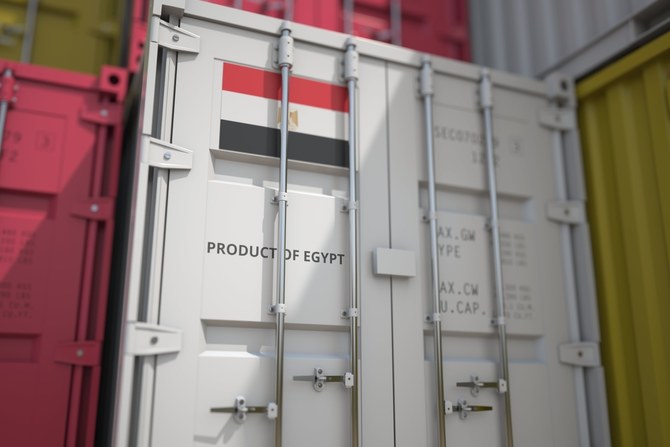
CAIRO: Egypt’s non-oil private sector continued to shrink in April despite a $35 billion investment deal signed with the UAE in February and an $8 billion International Monetary Fund agreement in March, a survey showed on Wednesday.
The S&P Global Purchasing Managers’ Index for Egypt edged down to 47.4 in April from 47.6 in March, remaining below the 50.0 threshold that separates growth from contraction for a 41st consecutive month.
“Business activity once again fell markedly as firms commented on difficult market conditions, with the decline leading to a renewed drop in employment,” S&P Global said.
The employment sub-index slipped to 49.7 in April from 50.8 in March.
Egypt signed an agreement with the IMF on March 6, with an initial $820 million payout received in April and a second, $820 million payout expected after an IMF review in June.
In granting the financial support, the IMF cited shocks to the Egyptian economy from the crisis in neighboring Gaza. Egypt devalued its currency on March 6 and hiked interest rates by 600 basis points as part of the deal.
The output sub-index climbed to 44.8 in April from 44.5 in March and the new orders index improved to 45.5 from 45.0. Business sentiment also improved, with the future output expectations index climbing to 55.3 in April from 52.2 in March.
“Sentiment was at a six-month high, reflecting hopes of exchange rate stability, lower prices and better material availability,” S&P Global said.
Meanwhile, global ratings agency Fitch last week revised Egypt’s outlook to positive from stable.
The agency affirmed Eygpt’s rating at ‘B-,’ citing reduced external financing risks and stronger foreign direct investment.
Foreign investors have poured billions of dollars into Egyptian treasury bills since the country announced the IMF loan program. After the investment in the country’s foreign portfolio and the support from the UAE, Egypt’s net foreign assets deficit shrank by $17.8 billion in March.
Fitch says that initial steps to contain off-budget spending should help to reduce public debt sustainability risks.
The country straddles North Africa and West Asia and has been grappling with an ongoing economic crisis linked to persistent foreign currency shortages. In the fourth quarter, its foreign debt climbed by $3.5 billion to $168.0 billion.
Meanwhile, Moody’s also revised its outlook on Egypt to “positive” in early March while affirming its ratings due to the high government debt ratio and weaker debt affordability compared to its peers.
Oil Updates – prices dip on rising US stockpiles, cautious supply expectations
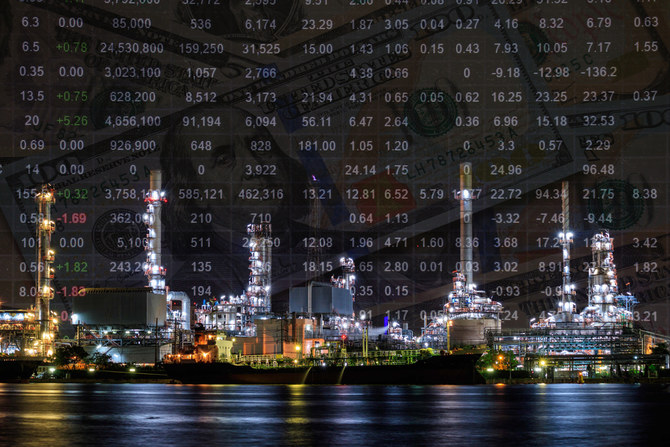
NEW YORK: Oil prices fell in Asian trade on Wednesday as industry data showed a pile-up in crude and fuel inventories in the US, a sign of weak demand, and cautious supply expectations emerged ahead of an OPEC+ policy meeting next month, according to Reuters.
Brent crude oil futures fell 57 cents, or 0.69 percent, to $82.59 a barrel by 9:45 a.m. Saudi time. US West Texas Intermediate crude futures fell 53 cents, or 0.68 percent, to $77.85 a barrel.
Both benchmarks fell marginally in the previous session on signs of easing supply tightness and weaker global oil demand from an Energy Information Administration forecast report on Tuesday.
US crude stocks rose by 509,000 barrels in the week ended May 3, market sources said, citing American Petroleum Institute figures. Gasoline and distillate fuel inventories also rose, they said.
“API numbers released overnight were moderately bearish due to stock builds in both crude and products ... Concern over weaker-than-usual US gasoline demand and this stock-build have weighed on the prompt RBOB gasoline crack,” ING analysts said in a client note.
Official US government data on stockpiles is due at 5:30 p.m. Saudi time. Analysts polled by Reuters expect US crude oil inventories to have fallen by about 1.1 million barrels last week.
Cautious expectations on supply cuts from the Organization of the Petroleum Exporting Countries and its allies ahead of a June 1 policy meeting also weighed on markets.
“Oil prices have come under further pressure as noise around OPEC+ production policy grows,” the ING analysts said. “Expectations are that members will extend their additional voluntary supply cuts beyond the second quarter of this year.”
Meanwhile, hopes of a ceasefire in Gaza have also put pressure on oil prices in recent sessions, with some analysts saying the risk premium on oil declined in tandem.
“The fall in oil prices since Iran and Israel’s back-and-forth attacks suggests that some of the risk premium in prices has now unwound,” said economist Bill Weatherburn from Capital Economics in a client note.
“Prices continue to be supported by OPEC+ production cuts but we suspect that members will gradually unwind these cuts from July, pushing oil prices lower,” he added.
The US believes negotiations on a Gaza ceasefire should be able to close the gaps between Israel and Hamas. US Central Intelligence Agency Director Bill Burns will travel to Israel on Wednesday for talks with the Israeli Prime Minister Benjamin Netanyahu and other top officials, a source familiar with the matter told Reuters.
Some analyst expectations that short-term demand remains well-supported limited overall price declines.
“Much talk of economic run cuts in recent weeks is overblown in our opinion, with margins still healthy enough, which means rather that Asian demand could rather pick up once turnarounds peak and diminish,” said Sparta Commodities analyst Neil Crosby.


